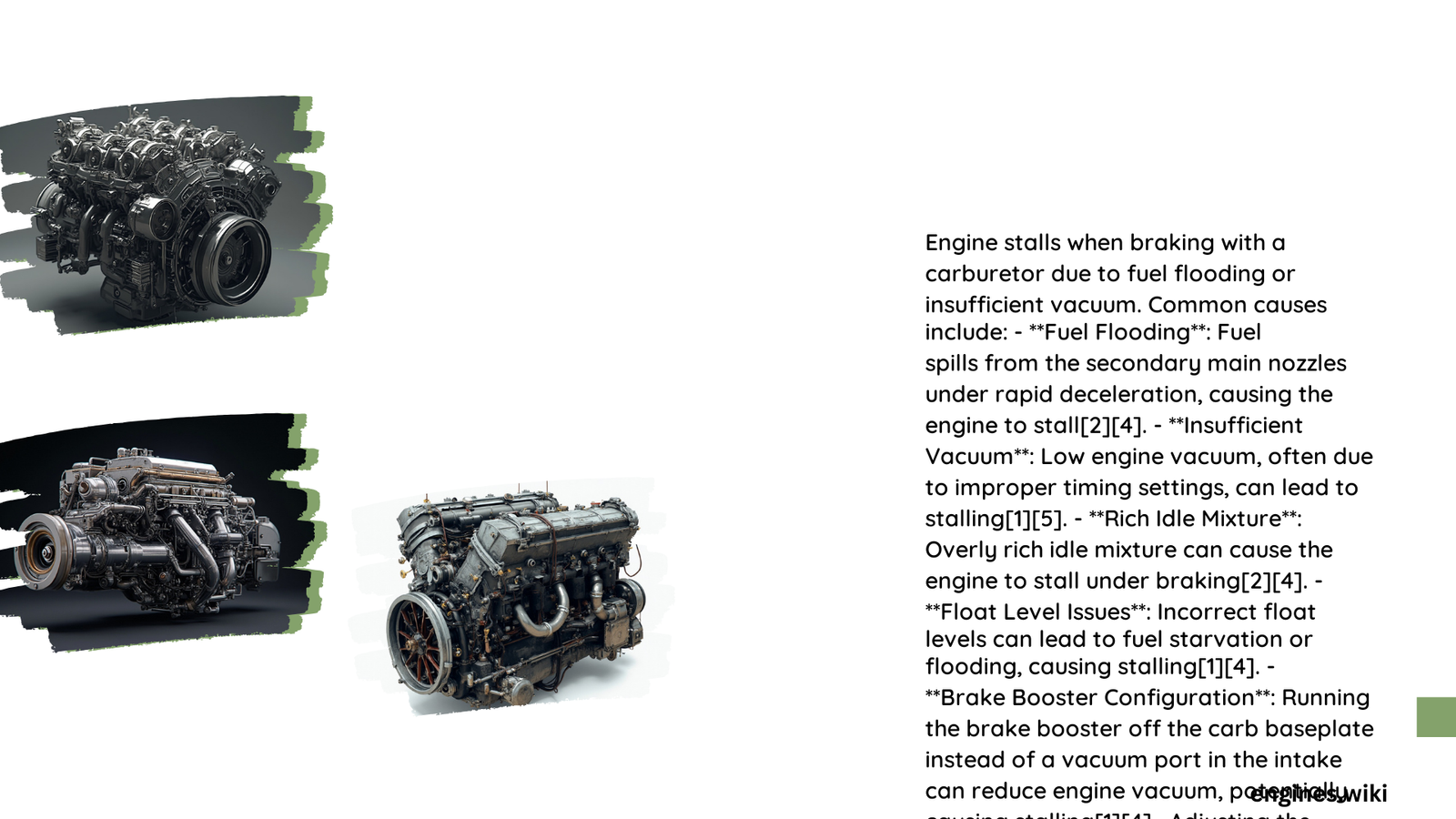Engine stalls when braking in carbureted vehicles can be frustrating and dangerous. This issue often stems from improper carburetor settings, vacuum problems, or idle speed issues. Proper diagnosis and adjustment of the carburetor can resolve these stalling problems, improving vehicle performance and safety. This article explores the causes of engine stalls during braking and provides practical solutions for carburetor-equipped vehicles.
What Are the Main Causes of Engine Stalls When Braking in Carbureted Vehicles?
The primary causes of engine stalls when braking in vehicles with carburetors include:
- Incorrect carburetor adjustments
- Low engine vacuum
- Improper idle speed settings
- Faulty vacuum advance mechanisms
- Clogged fuel jets or passages
Let’s delve deeper into each of these causes and their solutions.
How Do Carburetor Adjustments Affect Engine Performance During Braking?

Carburetor adjustments play a crucial role in preventing engine stalls when braking. Here are the key adjustments and their impacts:
Idle Speed Settings
- Aluminum-cylinder engines: Set idle speed to 1750 RPM
- Cast-iron cylinder sleeve engines: Set idle speed to 1200 RPM
Proper idle speed ensures the engine has enough power to maintain operation during braking.
Air-Fuel Mixture Adjustments
- Idle mixture screw:
- Turn clockwise until the needle lightly touches the seat
-
Then turn counterclockwise 1-1/2 turns
-
High-speed mixture screw:
- Turn clockwise until the needle just touches the seat
- Then turn counterclockwise 1-1/4 to 1-1/2 turns
These adjustments ensure the correct air-fuel mixture at both idle and higher engine speeds.
What Role Does Engine Vacuum Play in Preventing Stalls During Braking?
Engine vacuum is critical in preventing stalls when braking. Here’s why:
- During hard braking, engine vacuum can drop significantly
- Low vacuum can cause the engine to stall
- Proper initial timing (e.g., 16-18 degrees) helps maintain adequate vacuum
Vacuum Pressure Measurements
| Engine State | Ideal Vacuum Pressure |
|---|---|
| Idle | 12-14 inHg |
| Braking | May drop, but should remain stable |
Maintaining a stable idle vacuum is crucial to prevent stalling.
How Does Idle Speed Affect Engine Stalls When Braking?
Idle speed has a significant impact on engine performance during braking:
- Too low: Engine may not have enough power to maintain operation
- Too high: Can result in poor fuel efficiency and potential overheating
Maintaining the correct idle speed range is essential for preventing stalls:
- Aluminum-cylinder engines: 1750 RPM
- Cast-iron cylinder sleeve engines: 1200 RPM
What Are the Steps to Diagnose and Adjust Carburetor Settings?
Follow these steps to diagnose and adjust carburetor settings:
- Check idle speed using a tachometer
- Measure vacuum pressure with a vacuum gauge
- Adjust idle mixture screws for highest vacuum reading at idle
- Set high-speed mixture screw
- Verify initial timing
- Test drive to confirm improvements
Tools Required
- Vacuum gauge
- Tachometer
- Carburetor cleaner
- Screwdrivers and wrenches
Time and Cost Estimates
| Task | Time | Cost |
|---|---|---|
| Initial diagnosis | 30-60 minutes | $50-$100 (DIY) |
| Adjustments | 1-2 hours | $100-$400 (Professional) |
| Tools | N/A | $50-$200 |
| Parts (if needed) | N/A | $20-$100 |
How Can You Prevent Future Engine Stalls When Braking?
To prevent future engine stalls when braking in carbureted vehicles:
- Regularly clean the carburetor
- Check and adjust idle speed monthly
- Inspect vacuum lines for leaks or damage
- Maintain proper ignition timing
- Use high-quality fuel and fuel filters
- Consider upgrading to an electronic ignition system
By following these preventive measures and understanding the relationship between carburetor settings and engine performance, you can significantly reduce the likelihood of engine stalls when braking.
